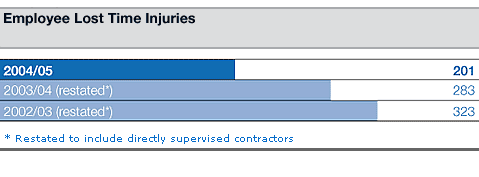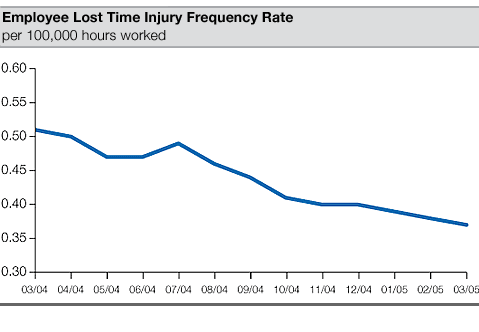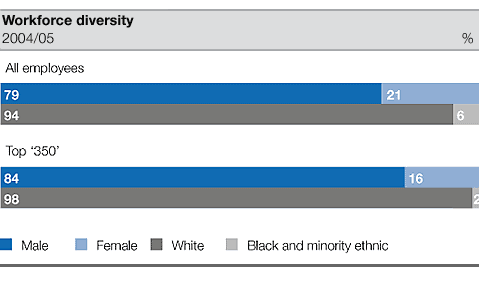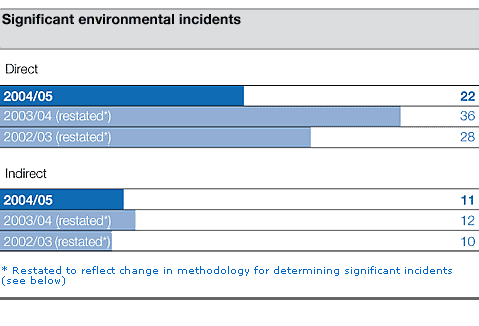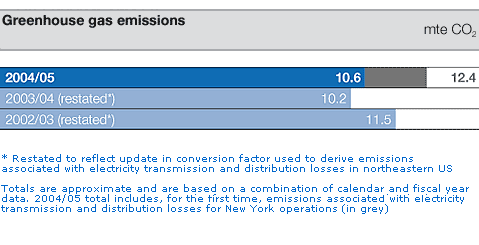Operating and Financial Review
Operating Review
Operating responsibly
- Governance and corporate responsibility
- Safety and occupational health
- Valuing people through inclusion
- Business ethics
- Leadership development
- Employee engagement
- Environmental management
- Climate change
- Contaminated land
- Electric and magnetic fields
- Human rights
- Community involvement
We believe operating our business in a responsible manner and our strong financial performance go hand-in-hand. Having due regard for the impacts we have on society will continue to deliver benefit to our employees, our shareholders, the environment and to the millions of citizens served by our networks.
Our responsible business approach and performance have continued to gain external recognition. We have improved our placing in the Dow Jones Sustainability World and Stoxx indices and retained our listing in FTSE4Good, all of which track companies with a high standard of social and environmental performance.
In April 2005, we were placed second in Business in the Community's third Corporate Responsibility Index, a leading UK benchmark of responsible business practice and were the first placed utility for the second year running. In April 2005, National Grid Transco became a constituent of the FTSE ISS Corporate Governance Index, newly created to track the performance of companies achieving a high standard of corporate governance.
Internal endorsement of our approach is equally important. In July 2004, we carried out our first Group-wide employee opinion survey since the creation of National Grid Transco in 2002. Over 12,000 of our employees responded, providing encouraging feedback on our approaches to safety, environmental management, business ethics and the fair treatment of employees.
Governance and corporate responsibility
Our 'Framework for Responsible Business', set out in detail on our Group website (www.ngtgroup.com/responsibility), defines the principles by which we manage our business, sets the context for corporate governance and helps us take account of economic, environmental and social factors in our day-to-day decision making. A suite of Group-wide policies and position statements, also available on our website, underpins the Framework.
Board oversight of our non-financial risks, policies and standards is through the Risk & Responsibility Committee. Since the retirement of James Ross in October 2004, Stephen Pettit, Non-executive Director, has chaired the Committee. Over the past year, it has met five times and through the work of the Committee and our Group-wide risk management process (described in Risk and Compliance Management), we have identified a number of priority areas for improving the non-financial performance of our operations around the world, as discussed below.
Safety and occupational health
We believe safety is a core business value and recognise the responsibility each of us has to ensure our own safety and the safety of colleagues with whom we work.
Our approach to safety management is set out in our Vision for Safety and our Group Safety and Occupational Health policy. Over the last year, our priority areas for employee safety have remained culture change through introducing behavioural-based safety leadership, improving our approach to risk assessment and the integration of the results into job briefings.
During 2004/05, we included for the first time directly supervised contractors in our employee safety statistics for our UK Gas Distribution business, as this more accurately recognises the day-to-day management of their safety performance. When the number of LTIs in 2003/04 (254) is restated to include this type of contractor, the number of LTIs across the Group has reduced from 283 in 2003/04 to 201 in 2004/05, a 29% improvement. The Group Lost Time Injury Frequency Rate over the same period has improved from 0.51 to 0.37, a 27% improvement.
The 2004 employee opinion survey provided encouraging feedback on our approach to safety. Of the employees responding, 86% considered that the Group has a clear commitment to operating safely and 84% considered that their supervisor places a strong emphasis on safe working.
Our target of zero work-related injuries and illnesses extends to those who work with us. During the past year, there has been a 37% reduction in contractor LTIs across the Group compared with 2003/04. For a second year, our UK Gas Distribution business has shown a significant improvement, with a 42% reduction in contractor LTIs compared with 2003/04.
Against this much improved background, we record with regret the following deaths associated with our operations. In separate incidents, two contractors died while working on our US electricity distribution system and one contractor died while travelling in the UK between work sites. Sadly too, an elderly member of the public died after being hit by a vehicle from our UK Gas Distribution operations. In the UK, an employee died while travelling to work.
We will continue our efforts to safeguard our employees, those who work with us and the public in everything we do.
No business can be competitive and wholly productive without a healthy and productive workforce. We are committed to eliminating work-related ill-health among our employees by identifying occupational risks and managing them, offering advice, and encouraging healthy living. During 2004/05, around 2.4% of available workdays in the UK and 3.5% in the US were lost due to sickness absence. This compared with 2.4% as an average for the UK energy/water sector. A similar comparison is not available for the US.
Our employee opinion survey looked to identify any underlying causes of work-related stress. Subsequent independent expert analysis of the results has shown we compare well with other organisations.
Valuing people through inclusion
We are committed to developing and operating our business in a way that results in a more inclusive culture.
We believe that fostering diversity is everyone's responsibility and open, honest and respectful communication is the cornerstone of good business.
In January, we launched our Group-wide Inclusion and Diversity Vision by sending an information pack to every employee and have established Group-wide steering groups to develop and execute action plans. We will establish a set of measures against which to track our progress and we will continue to encourage regular feedback from our internal and external stakeholders. Fundamentally, we believe that a positive approach to Inclusion and Diversity is not a 'nice to have' but is essential for us to attract and retain the best people, improve our effectiveness, deliver superior performance and enhance the success of our Company.
Inclusion and Diversity Vision
We will strive to develop and operate our business in a way that results in a more inclusive and diverse culture. This will enable us to attract and retain the best people, improve our effectiveness, deliver superior performance and enhance the success of the Company.
We will ensure all employees, regardless of race, gender, nationality, age, disability, sexual orientation, religion and background, have the opportunity to develop to their full potential. We will prevent artificial or prejudicial barriers from getting in the way of their development.
- We believe that fostering diversity is everyone's responsibility.
- We believe that open, honest and respectful communication is the cornerstone of good business.
- We believe that a positive approach to Inclusion and Diversity is not a 'nice to have' but is fundamentally the right thing to do for us as a business.
Business ethics
Our UK Code of Business Conduct and US Standards of Conduct set out the ethical standards that we expect each employee to meet while conducting business for the Group. Breaches of these standards can result in disciplinary action up to and including dismissal.
In April 2004, we communicated our UK Code of Business Conduct to all employees through a series of cascade training sessions. Although the UK Code of Business Conduct is still relatively new, a range of calls have been received on our 24-hour business conduct helpline alleging potentially inappropriate conduct. All allegations are independently investigated and reported to our Business Conduct Committee, comprising senior management from the UK businesses, who satisfy themselves that reported breaches have been thoroughly and promptly investigated, and where appropriate, acted upon and any necessary improvements implemented.
In the US, our Standards of Conduct and employee helpline have been in place for more than a decade. Annually, a Standards of Conduct campaign/refresher training is conducted for all employees. New employees receive the Standards of Conduct document and are required to view related training videos provided by Human Resources. Our US Ethics Office has the responsibility for answering questions about ethical conduct, receiving and evaluating reports of potential misconduct, and ensuring that allegations are fully and promptly investigated.
The employee opinion survey confirmed that the majority of employees believed we are an ethical organisation, are aware of the codes, and feel comfortable that reported issues will be properly and thoroughly investigated. We are developing a communications strategy to maintain and improve the levels of awareness throughout the Group, as well as including business ethics awareness training within the induction process in the UK.
Leadership development
During the year we have continued our focus on robust succession planning processes, recognising that our people are at the heart of our continued success and our long term sustainability. Strong leadership skills are integral to creating a positive culture that recognises and values individual contributions and we have continued with our programme to develop leadership capabilities through our Developing Business Leaders programme for Group-wide senior management. This programme continues to build on the strong partnerships with the Centre for High Performance Development and Wharton and Insead Business Schools.
Our recruitment schemes for apprentices, graduates and university placement students in the UK and intern programme in the US have been successful in attracting high calibre individuals from the external market. The need to grow our talent from within and to address the decline in students graduating from technical engineering subjects remain essential areas of focus for the future success of our business.
Employee engagement
The 2004 employee opinion survey demonstrated a positive response concerning employee engagement. Our employees tell us that they are proud to work for us, are personally motivated to help us be successful and are willing to put in increased efforts to help the Group succeed. However, we have recognised that there are a number of areas still to be worked on and as a result we have identified a number of Group-wide priorities which we are now addressing across each of the businesses. These include the need to improve communications, ensuring that our Group strategy is clearly explained and understood, and managing change processes in a better way. We will continue to progress with these over the coming year.
The survey also highlighted the need to reinforce our performance management and development planning process.
We are creating opportunities to involve employees to a greater degree and the employee opinion survey, focus groups and project specific steering groups have enabled to us to promote two way feedback.
We believe that our approach to employee reward and the continued encouragement of share ownership amongst our employees helps to promote the links between employee and shareholder objectives. Total reward statements were produced for all UK employees during 2004, complementing those already provided to US employees. These were well received and it is our intention to repeat this on an annual basis.
Environmental management
Our Group-wide Environment policy provides a framework for managing the environmental impacts of our businesses. It helps to set goals to promote continual improvements in environmental performance and focuses the organisation on addressing the most important environmental issues and opportunities.
We have improved our methodology for determining the significance of incidents resulting in the release of methane from our UK gas networks to bring it in line with the approach used for our other significant greenhouse gas, sulphur hexafluoride. As a result, the total number of significant incidents in 2003/04 arising directly from our activities is restated from 46 to 36. For the same reason, the number of significant incidents resulting from third party damage to our networks, including adverse weather conditions, is restated from 26 to 12. During 2004/05, significant incidents arising directly from our activities and resulting from third party action numbered 22 and 11 respectively.
None of these incidents have led to environmental damage that resulted in prosecution by enforcement bodies. However, in January 2005, our subsidiary Transco plc pleaded guilty to a charge under the UK's Water Resources Act 1991 following an incident at Caerphilly gas holder in 2002 and was fined £8,000 plus costs. In the US, we received 14 environmental citations during 2004/05 compared with 11 for 2003/04. Only one of these attracted a fine of $3,000 compared with total fines of $7,850 the previous year.
Basslink received two citations from the environmental regulator, the Tasmanian Department of Primary Industries, Water, and Environment (DPIWE), attracting total fines of $1,000 (Aus) for actions of the turnkey contractor in breach of licence obligations. DPIWE has since agreed that the contractor should also have licence obligations so that any future notices can be served on it directly. This change is in recognition of the effort Basslink has put into managing the contractor performance.
Central to our approach to managing our environmental impacts is the ISO14001 international standard for environmental management systems. We expect all of our businesses to develop systems that conform to the standard and to seek external certification where there is a business case to do so. The majority of our operations already conform to ISO14001 and in 2004 a further part of our operations achieved certification to the standard. This has increased the percentage of employees across the Group working to a certified environmental management system from approximately 80% at 31 March 2004 to 85% at 31 March 2005.
As with safety, our employees have provided valuable feedback on our approach to environmental management. Of those responding to the 2004 employee opinion survey, 85% considered that the Group acts responsibly on environmental issues.
Climate change
Our Framework for Responsible Business contains a commitment to protect the environment for future generations, including making our contribution to minimising climate change. We are also very supportive of the steps being taken by the UK Government to address the issue of climate change.
In December 2004, we published a Public Position Statement, 'Energy Delivery and Climate Change'. We continue to provide essential infrastructure that will facilitate generators moving to alternative sources of energy, including renewables, with the aim of reducing greenhouse gas emissions.
We have improved the capture of our greenhouse gas emissions by including for the first time in 2004/05, emissions associated with electricity transmission and distribution losses for our New York operations. Our emissions for 2004/05 amounted to some 12.4 million tonnes CO2 equivalent (mte CO2). The graph above shows our comparative performance with previous years.
Across our operations, the largest source of greenhouse gas emissions continues to be methane leakage and venting from our UK gas networks, accounting for some 38% of our total emissions. Our long-term programme to replace iron mains with polyethylene pipes will progressively reduce this leakage.
The new European Union Emissions Trading Scheme came into force in January 2005. The scheme, aimed at reducing total greenhouse gas emissions by member countries, requires participating companies to surrender allowances, on an annual basis, equal to their emissions of carbon dioxide from specified sources. Any deficit will need to be made up by buying allowances from a market for surplus allocations.
The majority of National Grid Transco's emissions covered by the scheme are from gas turbine compressors installed on the UK's NTS. This accounts for approximately 8% of our total emissions. The demand on this system is in part dictated by the location and running regime of power stations. A further move from coal and oil towards gas-fired generation may conceivably lead to an increase in our own emissions while allowing the UK as a whole to meet its reduction commitments for greenhouse gas emissions. To balance the option of buying up allowances if our allocation does not meet our full requirement, we are also looking at investment options to reduce our emissions.
A detailed analysis of our greenhouse gas emissions, including an explanation of the changes, will be available on our website.
Contaminated land
We continue to manage our portfolio of contaminated land to the benefit of both shareholders and the environment. These sites include former manufactured gas plants, industrial landfills, former gas holders and older substations on both our electricity distribution and transmission networks. Sites can sometimes have a complex mix of contamination dating back over 100 years.
In the UK, our remediation programme has a main focus on managing the environmental risk followed by the remediation and subsequent development of the land for commercial reasons. In the US, in any given year, we remediate the highest environmental risk sites and/or those sites we are required to remediate by regulatory agencies, with a goal of returning these sites to productive public or private use.
In the UK, our subsidiary SecondSite Property manages 470 contaminated sites and has completed remediation work at 39 locations in 2004/05. In the US, we have responsibility for 170 contaminated sites, the vast majority of which are manufactured gas plants, and have completed remediation projects at two sites.
Electric and magnetic fields
Our Public Position Statement on Electric and Magnetic Fields (EMFs) sets the framework within which we continually assess the scientific evidence in this area, determine any implications for the business, and explain to society what the science is telling us.
In all our operations, we seek to comply as a minimum with EMF regulations, guidelines or practices in force in the countries and different jurisdictions in which we operate. Where other companies (such as telecommunications operators) use our assets, we expect them similarly to comply with the relevant regulations, guidelines or practices.
While the balance of scientific evidence is against EMFs resulting in adverse health impacts, we recognise that there is some limited scientific evidence suggesting the possibility and there are parts of society that are concerned about this issue. Differences in opinion on the possible health effects of EMFs have in the past often led to confrontation in the media between industry and some interest groups. In 2003, we took the initiative to improve the dialogue between the various parties with an interest in this issue, by creating a Stakeholder Advisory Group on EMFs (SAGE) with representation from industry, Government, academia, professional bodies and interest groups. SAGE has continued to meet throughout 2004/05 and has provided an important opportunity for stakeholders with opposing views to voice their concerns. As a result of the success of SAGE, the participants have now agreed to establish a more formal Stakeholder Advisory Group under the sponsorship of the Department of Health.
Human rights
The way we manage and invest in both infrastructure and operations affects the comfort and well-being of the millions of people who depend on our services.
Our Public Position Statement on Human Rights states our commitment to the protection of human rights within the sphere of our influence and ensuring that our own operations are a force for good.
We have continued our work with the Business Leaders Initiative on Human Rights, a three-year initiative aimed at developing practical business tools to incorporate human rights into day-to-day business decision-making. The value of the initiative in influencing the debate on the role of business in human rights has been recognised by the UN High Commissioner on Human Rights.
In September 2004, our Risk & Responsibility Committee reviewed the Group's policies, procedures, management systems and implementation processes from a human rights perspective. This review confirmed to the Committee our management controls and community support initiatives are effectively focused and provide protection and realisation of basic human rights for those people who are affected by our operations.
Community involvement
We are committed to developing our role as a corporate citizen as stated in our Framework for Responsible Business. We encourage and support investment in the community through both the activities of our employees and our financial contributions, with an emphasis on developing partnerships.
During 2004/05, we contributed £1 billion to the communities we operate in, comprising sales, employment, property and corporate taxes.
While for many years National Grid Transco, and its predecessor companies, developed innovative programmes to deal with challenging social issues, a unified Group-wide approach had not been established. In September 2004, the Group Executive agreed to establish a Social Policy Committee to identify priority areas for community investment initiatives and develop a coherent approach across the Group while meeting local or regional business objectives. The Committee is chaired by the Group Chief Executive with senior representatives from each of the main business areas, and reports to the Board's Risk & Responsibility Committee. This ensures that the Social Policy Committee is well-placed to guide the level and balance of resource commitments in line with business priorities and aligns with our belief that it is possible to create both shareholder value and social value.
An example of how we are aligning our community investment spend with our business is in the area of fuel poverty. In the US, we make a considerable financial contribution to providing direct subsidies to customers making energy efficiency investments, in addition to supporting a fuel poverty assistance programme in our operating areas. In the UK, we continue to work through our Affordable Warmth Programme which, since 1999, has installed energy saving measures in over 344,000 homes and trained over 4,700 people in energy efficiency skills.
In the US, our educational services programme is offered to elementary schools in our service territory and reaches more than 300,000 students annually. We also support a number of scholarships in New England at both undergraduate and graduate level. In the UK, we support programmes to encourage the brightest talent and more diverse sources of future employees, for example through the National Academy for Gifted and Talented Youth and the Arkwright Scholarship Programme.


